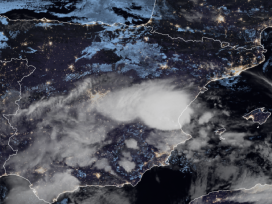Many of the people opposed to the independence of Catalonia would start any debate on the subject by criticizing the actions of their own side. Some reproach the government for its passivity, some for its rigidity. The government is right, but that is not enough: not since King Lear’s Cordelia have we seen such an unfortunate communication strategy. Others criticize the voluble attitude of the parties – they can become hawkish or dovish if that suits them. They often lament the mismanagement of the attempted referendum on 1 October, which combined two aspects that should have been avoided: there were votes and there was violence. They differ about the charges against the independence movement leaders. Most of them – including the Spanish government – think that preventive detention for Oriol Junqueras i Vies and other members of the former Catalan government is a judicial decision which damages the constitutionalists’ and the Spanish government’s interests.
Most experts believed that there were legal reasons for the activation of Article 155, a constitutional provision whose goal is to restore legal order, although there was some uncertainty about its practical aspects. On Televisión Española, the Spanish public broadcasting network, there have been no unedifying spectacles equivalent to the burning of the Constitution that we saw on Catalan public television, and its journalists have often criticized the network’s political orientation, whereas the people working at Catalonia’s TV3 haven’t protested about the much more obviously propagandistic character of their outfit. But those who know how the Popular Party has managed national and regional media have reason to distrust the ability of the government to promote neutrality in Catalan public broadcasting – and it was probably wise not to intervene at TV3. Others remark that the way in which Spanish Prime Minister Mariano Rajoy has protected himself by means of institutions like the judiciary has in fact eroded them. There are also divergences assessing the role of education or the media in spreading pro-independence sentiment. And if evaluating their role in what has happened presents problems, to decide how you could change it seems even harder. Nobody is sure whether the things that have been broken can be fixed.
For quite some time I have spoken to people who favoured secession. Normally they did not seem ready to criticize the errors of the independence movement. A friend acknowledged in an email that what happened on September 6 and 7 was democratically dubious, but forgivable: ‘something collateral – part of a dirty war’. This was more than most people would concede publicly. Often, it seemed that everything was justified by the disproportion and perversity of the Spanish state.
But it seems clear that even from their point of view many things have been done wrong. These days we read critiques of Catalan authorities that come from nationalists and independence supporters. A former Catalan president, and a key figure in the bid for secession, Artur Mas, said that the conditions for independence didn’t exist (although he later qualified his statements). Former head of economy in the Catalan government Andreu Mas-Collel said that neither Catalans nor the Generalitat have the circumstances that allow them to become independent. Articles in La Vanguardia, Ara and other Catalan media warned about the consequences and dangers of the Generalitat’s behaviour and advised against a unilateral declaration of independence. This week, Joan Tardá, MP for the pro-independence party Esquerra Republicana in the Spanish parliament, admitted that secession lacked a social majority. There will be more criticism to come.
A survey published at the end of October seemed to indicate a deterioration of the social climate, or at least the conversation. Opponents of independence pointed out the discomfort they feel when they express their views. I am sure that many people who favour secession think that a society where people are afraid to express democratic opinions and where friendships are broken because of political issues is worse than a society where opposite views can happily coexist.
‘[T]he lies and misinformation of those who have manipulated the illusions of thousands of people should not pass without consequences.’
It was easy to imagine that the European Union was not going to support secession. But the lies and misinformation of those who have manipulated the illusions of thousands of people should not pass without consequences. To disqualify the European Union, as some independence supporters did, was a diversion: the leaders of the secessionist movement had to know what the position of the EU was -it had been repeated many times. Harsh words about the Union were only a way to hide a deceptive mechanism.
Until recently the promoters of independence talked about the supposed economic advantages of secession. On October 5th, former vice president Junqueras minimized the effects of the exit of companies motivated by the process and legal insecurity. More than 1,800 companies have moved their headquarters to other parts of Spain. The economic estimates of the money that has left the region vary, but exceed the most exaggerated accounts of the fiscal imbalance denounced by nationalists. The adventure is turning out to be much more expensive than what, years ago, was presented as reason for leaving Spain. A document written by the team of former vice president Junqueras advocated seeking ‘a democratic conflict of wide citizen support, aimed at generating political and economic instability that forces the state.’ It may be possible to force the state, but it is surprising that a leader seeks to cause political and economic instability when this is going to harm the citizens he represents.
‘[W]ho would have thought that Rajoy would become a manufacturer of constitutionalists?’
The illegal course of the independence movement cost Catalonia its biggest loss of autonomy in decades. In a particularly surprising twist of plot, pro-independence politicians claimed that the activation of Article 155 would violate the Constitution (which they themselves had violated in the Parliament, along with the Catalan Statute of Autonomy, on September 6th and 7th): who would have thought that Rajoy would become a manufacturer of constitutionalists? But in order to oppose the People’s Party, inside and outside Catalonia, there are those who are willing to do anything: even to defend ‘the regime of 1978’. The crucial thing is not so much that the declaration of independence occurred or not on 10 October: it was a declaration of dependency, tied to the interpretation of the Spanish government.
After the Catalan parliament voted the declaration of independence on October 27th, the Spanish government had no choice but to activate Article 155, which is based on Article 37 of the German constitution. The declaration of independence was voted by 70 out of 135 MPs, representing 48% of the popular vote, in a semi-empty parliament: the opposition boycotted the vote due to the alienation of their rights. This majority wouldn’t have been enough to change the Statute of Autonomy or lesser laws, but it was considered sufficient to justify a fateful decision such as a declaration of independence. It was a culmination of the breach of legality and opposition rights which had started on 6 September.
Rajoy has often been slow in confronting this crisis. But he was agile when he activated Article 155 and called for regional elections on 21 December. We have already seen too many negative results from this political experiment. Catalonia is more isolated within Europe: nobody has recognised its independence. Reckless, irresponsible Catalan authorities have brought it closer to Eurosceptic and populist groups. There is reputational damage at the international and state level, and citizens and companies have been placed in a legal limbo. The actions of the sacked Catalan authorities have discredited their cause: former president Carles Puigdemont, calling himself head of a government in exile, insults real exiles past and present, and has become something of an international embarrassment. Ms Clara Ponsantí, who was minister for education in Puigdemont’s government, declared that the situation was now worse than under Franco – in the dictatorship times, you were safe once you were in the French city of Perpignan, she said. The myth of Franco’s ghost might work for a while, but people could be forgiven if they start to suspect that the idea that France and the European Union are ruled by the dictator’s spectre is not the most plausible way to explain the independentists’ failure. Everyday life has worsened. Very important economic damage has been generated: it is not known whether the companies that have left will return, and although the moving of headquarters doesn’t entail the loss of jobs initially, this has happened in previous cases. Catalonia is going to suffer a loss of its self-government in the short term. Without entering into questions of democratic quality or minority rights abridged by the secessionists, the bid for independence has damaged the interests of the Catalans, even for those who, rightly or wrongly, placed their only hope on the fact that things would worsen till they became irreparable.
A Spanish version of this article was first published in Letras Libres online on 26 October 2017.







